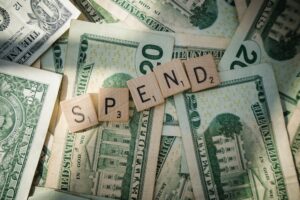Every few minutes, someone on TV (or web stream) is shouting about the economy. One channel says it’s booming. Another says it’s collapsing. One headline blames high egg prices, another celebrates job growth, and somehow both agree that China is somehow responsible for many of our other financial instabilities. But all this chatter and noise raises more questions than it answers. What actually is the economy (Progressive ad, anyone?), and more importantly, what does it mean for you?
Let’s clear the air. When most people talk about “the economy,” what they really mean depends on their perspective or their agenda. For some, it’s GDP. For others, it’s the stock market. For many or most, it’s the cost of groceries or gas. And while all those things can be connected, they’re not interchangeable. The price of eggs may be up, but that doesn’t automatically mean the economy is in trouble.
To understand what’s going on, it helps to separate some often-blurred terms. Let’s do some ECON 101:
- The Economy is the broad system of production, consumption, employment, and investment.
- Inflation refers to the rising price of goods and services.
- Cost of Living is your personal experience of those prices, shaped by where you live and what you spend on.
Understand Your Personal Economy
That’s why your personal economy matters so much more than the national one. While the headlines scream about macro trends, your personal economy is the only one you can control and the one that directly impacts your family’s quality of life. It’s your income, your expenses, your savings rate, and your long-term goals. It’s whether you can fund your retirement plan, take that vacation, not skip the memories, or cover an unexpected expense without stress.
A fun story that I never miss an opportunity to bring up; you might remember the 2017 Super Bowl, Patriots vs. Falcons. At halftime, the critics were declaring it over. But anyone watching the full game knows how that story ended. When you focus only on the halftime score or the loudest pundits, you miss the big picture playing out right in front of you. The Patriots were able to take it play-by-play and yard by yard and execute on one of the greatest sports comebacks of all time. Do you think Tom and company could have pulled that off if they were focused on the macro noise? No, they focused on the micro, and everyone performed their best by focusing on what they could control, not what they couldn’t.
Financial Decisions Driven By Fear and “What If!”
Too often, people make financial decisions based on fear-driven headlines or political narratives, without asking: How is my economy doing? Are your goals still on track? Is your plan built to weather short-term fluctuations? If your retirement investments are long-term by design, reacting to every bump in the market is like changing your game plan mid-drive because of crowd noise.
Yes, elections can bring changes to tax policy. Yes, interest rates influence mortgages. But unless you’re planning to move, make a large purchase, or retire in the next few months, it’s often wiser to stay the course and review your strategy with a clear head, not a Twitter feed.
My advice: You can’t control the global economy, and you probably can’t predict the next market cycle. But you can manage your economy: your savings, your spending, your goals, and how you navigate your family financial planning strategies.
So, before you self-diagnose and send yourself into economic hysteria based on the headlines, talk with a family financial planner like me—a professional who can help you understand the full financial picture. Spoiler alert, the economy that matters most isn’t the one on a 24-hour news cycle, it’s the one happening in your household, every day.





